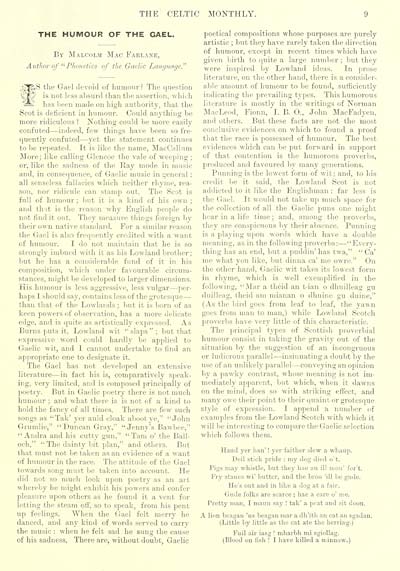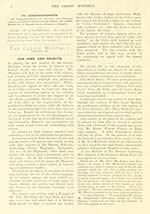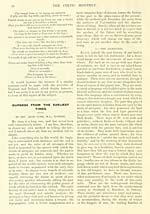Blair Collection > Celtic monthly > Volume 1, 1893
(19)
Download files
Complete book:
Individual page:
Thumbnail gallery: Grid view | List view

THE CELTIC MONTHLY.
THE HUMOUR OF THE GAEL.
Bv Malcolm Mac Farlane,
Author of " Phonetics of the Gaelic Language."
fiS the Gael devoid of humour] The question
') is not less absurd than the assertion, which
— ' has been made on high authority, that the
Scot is deficient in humour. Could anything be
more ridiculous? Nothing could be more easily
confuted — indeed, few tilings have been so fre-
quently confuted — yet the statement continues
to be repeated. It is like the name, MacCnllnm
More; like calling Glencoe the vale of weeping;
or, like the sadness of the Ray mode in music
and, in consequence, of Gaelic music in general :
all senseless fallacies which neither rhyme, rea
son, nor ridicule can stamp out. The Scot is
full of humour; but it is a kind of his own ;
and that is the reason why English people do
not find it out. They measure things foreign by
their own nati\ e standard. For a similar reason
the Gael is also frequently credited with a want
of humour. I do not maintain that he is so
strongly imbui d with it as his Lowland brother;
but he has a considerable fund of it in his
composition, which under favourable circum-
stances, might be developed to larger dimensions.
Kis humour is less aggressive, less vulgar — per-
haps 1 should say, contains less of the grotesque —
than that of the Lowlands ; but it is born of as
keen powers of observation, has a more delicate
edge, and is quite as artistically expressed. A -,
Burns puts it, Lowland wit "slaps"; but that
expressive word could hardly be applied to
Gaelic wit, and 1 cannot undertake to find an
appropriate one to designate it.
The Gael has not developed an extensive
literature — in fact his is, comparatively speak-
ing, very limited, and is composed principally of
poetry. But in Gaelic poetry there is not much
humour ; and what there is is not of a kind to
hold the fancy of all times. There are few such
songs as "Tak' yer auld cloak aboot ye," "John
Grumlie," " Duncan Gray." "Jenny's Bawbee,"
" Andra and his cutty gun," ''Tarn o' the Ball-
och," " The dainty bit plan," and others. Bui
that must not lie taken as an evidence of a want
of humour in the race. The attitude of the I lael
towards song must be taken into account, lie
did not so much look upon poetry as an ai t
whereby lie might exhibit his powers and confer
pleasure upon others as he found it a vent for
letting the steam off, so to speak, from his pent
up feelings. When the Gael felt merry he
danced, and any kind of words served to carry
the music : when he felt sad he sung the cause
of his sadness. There are, without doubt, Gaelic
poetical compositions whose purposes are purely
artistic ; but they have rarely taken the direction
of humour, except in recent times which have
given birth to quite a large number; but they
were inspired by Lowland ideas. In prose
literature, on the other hand, there is a consider-
able amount of humour to be found, sufficiently
indicating the prevailing types. This humorous
literature is mostly in the writings of Norman
Mael d, Fionn, I. B. O., John MacFadyen,
and others. But these facts are not the most
conclusive evidences on which to found a proof
that the race is possessed of humour. The best
evidences which can be put forward in support
of that contention is the humorous proverbs,
produced and favoured by many generations.
Punning is the lowest form of wit; and. to his
credit be it said, the Lowland Scot is not
addieied to it like the Englishman: far less is
the Gael. It would not take up much space for
the collection of all the Gaelic puns one mighl
hear in a life time ; and, among the proverbs,
they are conspicuous by their absence. Punning
is a playing upon words which have a double
meaning, as in the following proverbs: — "Every-
thing has an end, but a puddin' has twa," " Ca'
me what you like, but dinna ca' me owre." On
the other hand, Gaelic wit takes its lowest form
in rhyme, which is well exemplified in the
follow in-. "Mar a theid an t-ian o dhuilleag gu
duilleag, t In id am mianan o dhuine gu duinc,"
( As the bird goes from leaf to leaf, the yawn
goes from man to man,) while Lowland Scotch
have very little of this characteristic.
The principal types of Scottish proverbial
humour consist in taking the v.ra\ it y out of the
situation by the suggestion of an incongruous
or ludicrous parallel — insinuating a doubt by the
use of an unlikely parallel -conveying an opinion
by a pawky contrast, whose meaning is not im-
mediately apparent, but which, when it dawns
on the mind, does so with striking effect, and
many owe their point to their quaint or grotesque
style of expression. I append a number of
examples from the Lowland Scotch with which it
will lie interesting to compare the ( laelic selection
which follows them.
Hand yer liau' ! yer faither slew a wliaup.
Deil stick pride : my dog died o't.
I'ii:- may whistle, but they liae an ill mou' for't.
Fry stanes wi' butter, and the broo 'ill lie gude.
He's out aud in like a dog at a fair.
Guile folks are scarce : hae a care o' me.
Pretty man, I maim say ! tak' a peat and sit doon.
A lion beagan 'us beagan mar a dh'ith an eat an sgadan.
(Little by little as the cat ate the herring.)
Fuil air iasg ' mharhh mi sgiollag.
(Blood on risli ! I have killed a minnow.)
THE HUMOUR OF THE GAEL.
Bv Malcolm Mac Farlane,
Author of " Phonetics of the Gaelic Language."
fiS the Gael devoid of humour] The question
') is not less absurd than the assertion, which
— ' has been made on high authority, that the
Scot is deficient in humour. Could anything be
more ridiculous? Nothing could be more easily
confuted — indeed, few tilings have been so fre-
quently confuted — yet the statement continues
to be repeated. It is like the name, MacCnllnm
More; like calling Glencoe the vale of weeping;
or, like the sadness of the Ray mode in music
and, in consequence, of Gaelic music in general :
all senseless fallacies which neither rhyme, rea
son, nor ridicule can stamp out. The Scot is
full of humour; but it is a kind of his own ;
and that is the reason why English people do
not find it out. They measure things foreign by
their own nati\ e standard. For a similar reason
the Gael is also frequently credited with a want
of humour. I do not maintain that he is so
strongly imbui d with it as his Lowland brother;
but he has a considerable fund of it in his
composition, which under favourable circum-
stances, might be developed to larger dimensions.
Kis humour is less aggressive, less vulgar — per-
haps 1 should say, contains less of the grotesque —
than that of the Lowlands ; but it is born of as
keen powers of observation, has a more delicate
edge, and is quite as artistically expressed. A -,
Burns puts it, Lowland wit "slaps"; but that
expressive word could hardly be applied to
Gaelic wit, and 1 cannot undertake to find an
appropriate one to designate it.
The Gael has not developed an extensive
literature — in fact his is, comparatively speak-
ing, very limited, and is composed principally of
poetry. But in Gaelic poetry there is not much
humour ; and what there is is not of a kind to
hold the fancy of all times. There are few such
songs as "Tak' yer auld cloak aboot ye," "John
Grumlie," " Duncan Gray." "Jenny's Bawbee,"
" Andra and his cutty gun," ''Tarn o' the Ball-
och," " The dainty bit plan," and others. Bui
that must not lie taken as an evidence of a want
of humour in the race. The attitude of the I lael
towards song must be taken into account, lie
did not so much look upon poetry as an ai t
whereby lie might exhibit his powers and confer
pleasure upon others as he found it a vent for
letting the steam off, so to speak, from his pent
up feelings. When the Gael felt merry he
danced, and any kind of words served to carry
the music : when he felt sad he sung the cause
of his sadness. There are, without doubt, Gaelic
poetical compositions whose purposes are purely
artistic ; but they have rarely taken the direction
of humour, except in recent times which have
given birth to quite a large number; but they
were inspired by Lowland ideas. In prose
literature, on the other hand, there is a consider-
able amount of humour to be found, sufficiently
indicating the prevailing types. This humorous
literature is mostly in the writings of Norman
Mael d, Fionn, I. B. O., John MacFadyen,
and others. But these facts are not the most
conclusive evidences on which to found a proof
that the race is possessed of humour. The best
evidences which can be put forward in support
of that contention is the humorous proverbs,
produced and favoured by many generations.
Punning is the lowest form of wit; and. to his
credit be it said, the Lowland Scot is not
addieied to it like the Englishman: far less is
the Gael. It would not take up much space for
the collection of all the Gaelic puns one mighl
hear in a life time ; and, among the proverbs,
they are conspicuous by their absence. Punning
is a playing upon words which have a double
meaning, as in the following proverbs: — "Every-
thing has an end, but a puddin' has twa," " Ca'
me what you like, but dinna ca' me owre." On
the other hand, Gaelic wit takes its lowest form
in rhyme, which is well exemplified in the
follow in-. "Mar a theid an t-ian o dhuilleag gu
duilleag, t In id am mianan o dhuine gu duinc,"
( As the bird goes from leaf to leaf, the yawn
goes from man to man,) while Lowland Scotch
have very little of this characteristic.
The principal types of Scottish proverbial
humour consist in taking the v.ra\ it y out of the
situation by the suggestion of an incongruous
or ludicrous parallel — insinuating a doubt by the
use of an unlikely parallel -conveying an opinion
by a pawky contrast, whose meaning is not im-
mediately apparent, but which, when it dawns
on the mind, does so with striking effect, and
many owe their point to their quaint or grotesque
style of expression. I append a number of
examples from the Lowland Scotch with which it
will lie interesting to compare the ( laelic selection
which follows them.
Hand yer liau' ! yer faither slew a wliaup.
Deil stick pride : my dog died o't.
I'ii:- may whistle, but they liae an ill mou' for't.
Fry stanes wi' butter, and the broo 'ill lie gude.
He's out aud in like a dog at a fair.
Guile folks are scarce : hae a care o' me.
Pretty man, I maim say ! tak' a peat and sit doon.
A lion beagan 'us beagan mar a dh'ith an eat an sgadan.
(Little by little as the cat ate the herring.)
Fuil air iasg ' mharhh mi sgiollag.
(Blood on risli ! I have killed a minnow.)
Set display mode to: Large image | Transcription
Images and transcriptions on this page, including medium image downloads, may be used under the Creative Commons Attribution 4.0 International Licence unless otherwise stated. ![]()
| Early Gaelic Book Collections > Blair Collection > Celtic monthly > Volume 1, 1893 > (19) |
|---|
| Permanent URL | https://digital.nls.uk/75841596 |
|---|
| Description | Vol. I. |
|---|---|
| Shelfmark | Blair.54 |
| Attribution and copyright: |
|
| Description | A selection of books from a collection of more than 500 titles, mostly on religious and literary topics. Also includes some material dealing with other Celtic languages and societies. Collection created towards the end of the 19th century by Lady Evelyn Stewart Murray. |
|---|
| Description | Selected items from five 'Special and Named Printed Collections'. Includes books in Gaelic and other Celtic languages, works about the Gaels, their languages, literature, culture and history. |
|---|

